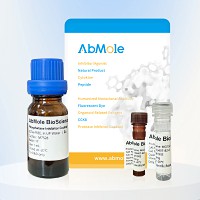All AbMole products are for research use only, cannot be used for human consumption.

Dickkopf related protein 1 (DKK-1) is a chemokine that belongs to the DKK protein family, promotes LRP6 internalization and degradation as it forms a ternary complex with the cell surface receptor Kremen. DKK-1 was originally identified as a Xenopus head forming molecule that behaves as an antagonist for Wnt signaling. It is one of the most up-regulated genes during androgen-potentiated balding, with DKK-1 messenger RNA up-regulated a few hours after DHT treatment of hair follicles at the dermal papilla in vitro. DKK-1 not only functions in head formation during development, but also regulates joint remodeling and bone formation indicating its potential role in the pathogenesis of rheumatoid arthritis and multiple myeloma.
ED50 < 6.0 µg/ml, measured in stimulation of alkaline phosphatase activity using CCl-226 cells.
Mouse Dickkopf related protein 1 (DKK-1) expressed the target gene encoding Ser30-His272.
Accession: O54908
Endotoxin < 0.2 EU/µg
Apparent Molecular Weight: 19~20 KDa, reducing conditions
Lyophilized after extensive dialysis against PBS.
| Form | Lyophilized powder |
| Solubility (25°C) | Reconstitute the lyophilized powder in ddH2O or PBS up to 100 μg/ml. |
| Storage | Stored at ≤ -20°C, stable for one year after receipt. Reconstituted protein solution can be stored at 2-8°C for 2-7 days and at -20°C for 3 months. |
| Related Cytokines and Growth Factors Products |
|---|
| Recombinant Human GDF-15 Protein (HEK293 N-hFc)
Growth-differentiation factor 15 (GDF15), also known as MIC-1, is a secreted member of the transforming growth factor (TGF)-β superfamily. GDF-15 has a role in regulating inflammatory and apoptotic pathways in injured tissues and during disease processes. GDF-15 overexpression arising from an expanded erythroid compartment contributes to iron overload in thalassemia syndromes by inhibiting hepcidin expression. |
| Recombinant Human FGFR1 Protein (HEK293, C-His)
FGFR1, also known as CD331, is a full-length representative protein consists of an extracellular region, composed of three immunoglobulin-like domains, a single hydrophobic membrane-spanning segment and a cytoplasmic tyrosine kinase domain. |
| Recombinant Human FGFR2 Protein (HEK293, C-His)
FGFR2, also known as CD332, acts as cell-surface receptor for fibroblast growth factors and plays an essential role in the regulation of cell proliferation, differentiation, migration and apoptosis, and in the regulation of embryonic development. FGFR2 plays an essential role in the regulation of osteoblast differentiation, proliferation and apoptosis, and is required for normal skeleton development. It also promotes cell proliferation in keratinocytes and imature osteoblasts, but promotes apoptosis in differentiated osteoblasts. |
| Recombinant Mouse BMP-4 Protein (E. coli, C-His)
Bone Morphogenetic Protein-4 (BMP-4) is a critical signaling molecule required for the early differentiation of the embryo and establishing of a dorsal-ventral axis. BMP-4 is secreted from the dorsal portion of the notochord, and it acts in concert with sonic hedgehog to establish a dorsal-ventral axis for the differentiation of later structures. |
| Recombinant Human Coagulation Factor X (HEK293, C-Fc)
Coagulation factor X, belongs to the peptidase S1 family. Coagulation factor X is initially synthesized in the liver. Coagulation factor X is a vitamin K-dependent glycoprotein that converts prothrombin to thrombin in the presence of factor Va, calcium and phospholipid during blood clotting. |
All AbMole products are for research use only, cannot be used for human consumption or veterinary use. We do not provide products or services to individuals. Please comply with the intended use and do not use AbMole products for any other purpose.


Products are for research use only. Not for human use. We do not sell to patients.
© Copyright 2010-2024 AbMole BioScience. All Rights Reserved.
